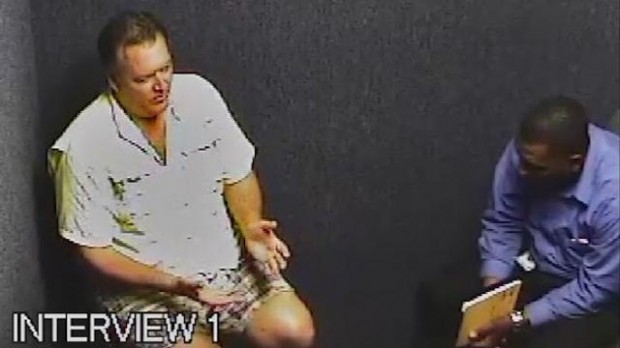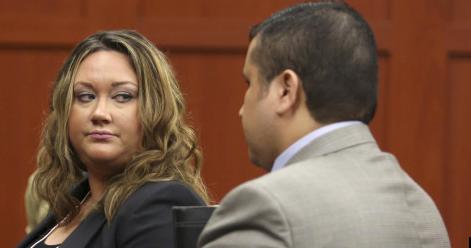Appellate Court Orders Emergency Hearing in “Loud Music” Murder Trial
 Michael Dunn interviewed by police following "loud music" shooting of Jordan Davis[/caption]
As we noted in our blog January 8 post on the case:
Michael Dunn interviewed by police following "loud music" shooting of Jordan Davis[/caption]
As we noted in our blog January 8 post on the case:
Andrew F. Branca is in his third decade of practicing law in the Commonwealth of Massachusetts. He wrote the first edition of the "Law of Self Defense" in 1997, and is currently in the process of completing the fully revised and updated second edition, which you can preorder now at lawofselfdefense.com. He began his competitive shooting activities as a youth in smallbore rifle, and today is a Life Member of the National Rifle Association (NRA) and a Life Member and Master-class competitor in multiple classifications in the International Defensive Pistol Association (IDPA). Andrew has for many years been an NRA-certified firearms instructor in pistol, rifle, and personal protection, and has previously served as an Adjunct Instructor on the Law of Self Defense at the SigSauer Academy in Epping, NH. He holds or has held concealed carry permits for Massachusetts, Connecticut, Rhode Island, New Hampshire, Maine, Pennsylvania, Florida, Utah, Virginia, and other states.
 Michael Dunn interviewed by police following "loud music" shooting of Jordan Davis[/caption]
As we noted in our blog January 8 post on the case:
Michael Dunn interviewed by police following "loud music" shooting of Jordan Davis[/caption]
As we noted in our blog January 8 post on the case:
Judge Russell Healey, presiding over the murder trial of Michael Dunn in the shooting death of Jordan Davis, promised the parties a decision Wednesday on releasing to the media the jail house telephone recordings of Dunn. Oddly, this was a decision all sides had thought he'd...
 Circuit Judge Russell Healey, presiding over Florida "loud music" murder trial[/caption]
The media intervenors, represented by Attorney Jennifer Mansfield, argued that the various orders of the 1st District Court of Appeals, which oversees Healey's court, compelled him to order the release of the recordings. Healey disagreed, arguing that a careful reading of the DCA's orders required merely that he vacate his own previous orders suppressing the recordings, not that he himself order their release.
The precise language of the DCA order is worth considering:
Circuit Judge Russell Healey, presiding over Florida "loud music" murder trial[/caption]
The media intervenors, represented by Attorney Jennifer Mansfield, argued that the various orders of the 1st District Court of Appeals, which oversees Healey's court, compelled him to order the release of the recordings. Healey disagreed, arguing that a careful reading of the DCA's orders required merely that he vacate his own previous orders suppressing the recordings, not that he himself order their release.
The precise language of the DCA order is worth considering:
Last Friday we noted that Circuit Judge Russell Healey, presiding over the trial of Michael Dunn, had denied a defense motion to limit media access to discovery evidence consisting of many hours of recorded phone conversations between Dunn and others while he was in jail...
 Shellie Zimmerman, with her then-husband George Zimmerman[/caption]
Today, the Florida Bar concluded that there was no credible evidence that O'Mara engaged in any such misconduct.
The closing of this investigation follows closely on the heels of O'Mara being named the National Trial Lawyer's Criminal Trial Lawyer of 2013, as previously reported here at Legal Insurrection: Zimmerman Attorney Mark O’Mara Named “National Criminal Trial Lawyer of 2013″
In the interview below, conducted a few days ago, O'Mara talked about how the case has affected his practice, and life:
Shellie Zimmerman, with her then-husband George Zimmerman[/caption]
Today, the Florida Bar concluded that there was no credible evidence that O'Mara engaged in any such misconduct.
The closing of this investigation follows closely on the heels of O'Mara being named the National Trial Lawyer's Criminal Trial Lawyer of 2013, as previously reported here at Legal Insurrection: Zimmerman Attorney Mark O’Mara Named “National Criminal Trial Lawyer of 2013″
In the interview below, conducted a few days ago, O'Mara talked about how the case has affected his practice, and life:
Not as much media attention as Trayvon-Zimmerman case, but wait for it....
Attorney Mark O'Mara is, of course, the lawyer who last summer successfully represented George Zimmerman against second degree murder charges for the shooting death of Trayvon Martin. Throughout my coverage of the trial here at Legal Insurrection I frequently noted how O'Mara's cool demeanor and outstanding...
Sadly, yesterday the Christian Science Monitor reports on a story where what started as the most minor of conflicts ended up with 71-year-old Curtis Reeves, a former police officer in the area who had retired 20 years ago as a Captain, shooting and killing 43-year-old Chad Oulson, a fellow movie goer. (Movie theater shooting: Did a retired cop shoot a fellow moviegoer for texting?) Both men, each accompanied by his wife, were attending the movie theater to view the just-released movie “Lone Survivor.” Naturally, before the movie itself began the audience was “treated” to s series of trailers for other upcoming movies. While these trailers were being run, Oulson was texting on his phone. Reeves, sitting behind Oulson and presumably disturbed by this activity, told Oulson to stop texting. Oulson replied that he was checking on the status of his 3-year-old daughter.
Based on reporting from the Florida Times-Union, it appears that Circuit Court Judge James Daniel has determined that it was the Jacksonville Sheriff's Office that is responsible for this past week's kerfuffle over the relaxed enforcement of Marissa Alexander's home detention. In a column updated today journalist...
Fixing a glitch in the self defense law....
Marissa Alexander will remain free on bail, ruled Circuit Judge James Daniel, albeit under tightens rules of release to account for the fact that "mistakes were made". The State, in the form of Andrea Corey's State Prosecutors office, had filed a motion this past Monday to...
 Judge Russell Healey, overseeing trial of Michael Dunn[/caption]
Before we get into some of Judge Healey’s more interesting jurisprudence, it may be useful to quickly summarize the case. Michael Dunn is charged with first-degree murder in the death of Jordan Davis, a 17-year-old high school student.
Judge Russell Healey, overseeing trial of Michael Dunn[/caption]
Before we get into some of Judge Healey’s more interesting jurisprudence, it may be useful to quickly summarize the case. Michael Dunn is charged with first-degree murder in the death of Jordan Davis, a 17-year-old high school student.
Three Chicago residents and an association of Illinois firearms dealers brought this suit against the City of Chicago (Mayor Rahm Emanuel is sued in his official capacity, which is the same as suing the City), challenging the constitutionality of City ordinances that ban virtually all sales and transfers of firearms inside the City’s limits.1 R. 80, Second Am. Compl. The ban covers federally licensed firearms dealers; even validly licensed dealers cannot sell firearms in Chicago. The ban covers gifts amongst family members; only through inheritance can someone transfer a firearm to a family member. Chicago does all this in the name of reducing gun violence. That is one of the fundamental duties of government: to protect its citizens. The stark reality facing the City each year is thousands of shooting victims and hundreds of murders committed with a gun. But on the other side of this case is another feature of government: certain fundamental rights are protected by the Constitution, put outside government’s reach, including the right to keep and bear arms for self-defense under the Second Amendment. This right must also include the right to acquire a firearm, although that acquisition right is far from absolute: there are many long-standing restrictions on who may acquire firearms (for examples, felons and the mentally ill have long been banned) and there are many restrictions on the sales of arms (forexample, licensing requirements for commercial sales). But Chicago’s ordinance goestoo far in outright banning legal buyers and legal dealers from engaging in lawful acquisitions and lawful sales of firearms, and at the same time the evidence does not support that the complete ban sufficiently furthers the purposes that the ordinance tries to serve. For the specific reasons explained later in this opinion, the ordinances are declared unconstitutional.
Well, Marissa Alexander simply can't bring her self to abide by the orders of a court, according to a story from First Coast News (FCN), Florida. The last time she was out on bail, and under a restraining order to stay away from her estranged husband,...
Donations tax deductible
to the full extent allowed by law.
Founder
Sr. Contrib Editor
Contrib Editor
Higher Ed
Author
Author
Author
Author
Author
Author
Editor Emerita

